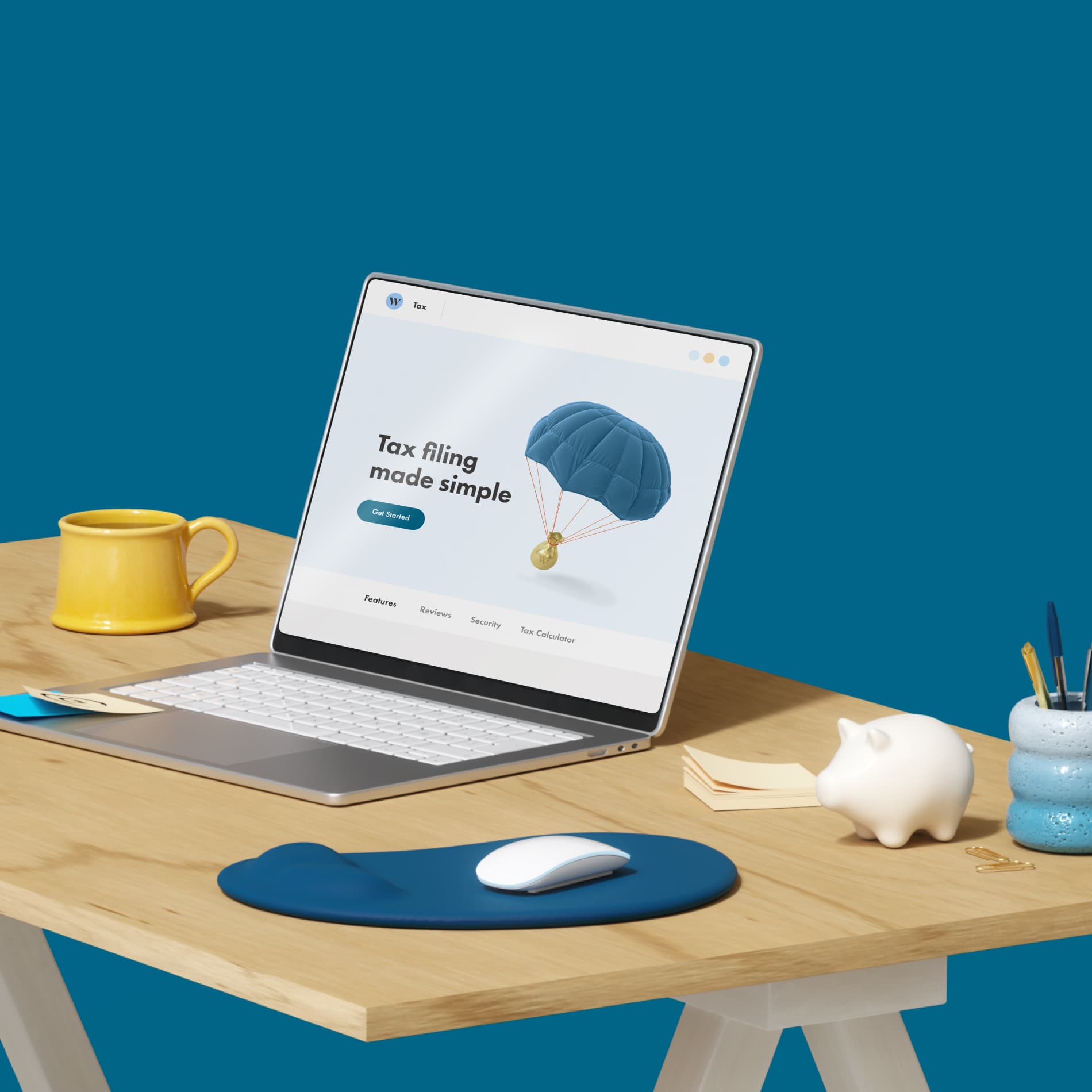
Finance for Humans
How to Be Your Own Boss Without Wanting to Fire Yourself
So you want to work from home. Good call! It's a great way of life. Here's how to do it without going crazy or getting sued for back taxes.
Wealthsimple makes powerful financial tools to help you grow and manage your money. Learn more
Yes, we’re living in the age of the free agent. The gig economy. A time of shared work spaces when there’s no such thing as an OOO (out of office) message because there isn’t even necessarily an office. There’s a lot to recommend such a lifestyle. You can go to the gym whenever you want. You can take a nap whenever you want. You never feel like you’re a slave to someone else’s idea of what your schedule should be. Plus four words: working from the beach. But despite what all the marketing people at Airbnb and WeWork want you to think, there are dangers. Like that, you know, you can take a nap whenever you want.
That and figuring out your own health insurance, retirement, Internet service.
Recommended for you
Well, as a grizzled veteran of The Life—my wife, an interior designer, and I have been freelancing since 2011—I have a little advice about how to live happily in the Pajama Pants Guild. And I got even more, better advice from Jason Heath, a Markham, Ontario–based financial planner who has helped people escape the office for years.
Be Your Own Drill Sergeant
Successful freelancing requires a baseline of self-discipline. Remember that afternoon when you had an office job and you pretended to be servicing a client account across town for four hours on a Thursday when in fact you were day drinking with that college roommate in from out of town? Those days are over. That corporate-freeloader mentality must die. To that end, draft a series of rules that you treat as a personal employment contract with yourself. No drinking before 6 p.m. Personal phone calls will be limited to an hour a day. I don’t turn the TV on during work hours. If you imagine you’ll ever even be tempted to play Candy Crush Saga during daylight hours, you might rethink your decision to go freelance altogether.
Know What You’re Getting Into Financially
Heath lays out the basics: If you think you’re going to be earning more than $30,000 a year, you’ll need to register with the CRA and begin collecting sales tax—the HST—from all of your clients. “Otherwise, you’ll personally be on the hook for that money with the CRA,” Heath warns. “This is the kind of mistake you make only once.” Figure out whether it makes sense to incorporate. Besides sounding rather impressive, becoming an incorporated sole proprietor can have major tax advantages, especially if you’re a married freelancer who makes a lot more than your spouse who works an office job. (By making your spouse a shareholder, you’ll be able to pay him or her, and thus be taxed at a lower rate.)
Heath strongly suggests considering life and disability insurance for your family, since leaving the corporate world means leaving behind all those company-provided benefits. “Disability is key,” Heath says. “If you can’t work, you’re going to want some income coming in. When you’re starting out and trying to minimize costs, it’s probably the last thing you want to think about, but you should.” And devise a financial safety net in case you vastly overestimated the market for your hand-carved wooden cummerbunds. In terms of saving, rather than contributing to a registered retirement savings plan (RRSP), which you can’t touch until retirement, consider a tax-free savings account (TFSA). “You can pull money back out of a TFSA if you need it,” Heath says. “For a beginning freelancer, it might be a better savings tool.” You can also get preapproved for a low-interest secured line of credit—the emergency flotation device of freelancers—which Heath advises is much easier to land if you’re still employed. “It’s a lot easier to get approved for these before you go freelance,” he says. “Banks like employees better than they like freelancers.”
Outsource
As a beginning freelancer, you will have a natural tendency to try to be an entire factory of one, a machine that does every task involved in whatever business you happen to be in. This might seem like a responsible way to work, but this would be wrong. The idea of paying others to do work you’re capable of doing yourself will pain you at first, but you’ll be rewarded with your sanity—and ultimately more income. Robin hired a bookkeeper at $30 an hour to do all of her billing. “I’d have thrown myself off a bridge by now otherwise—I’m sure of it,” she tells me. I’m a pitifully slow typist, so I pay a nice lady with lightening-fast fingers $20 an hour to transcribe my interviews, and so I spend $60 on a job that would otherwise take me an entire day to complete myself. And by God, find a good accountant. TurboTax is great for office monkeys, but you need a degree—or at the very least, a Xanax prescription—to maneuver around the CRA’s rules on self-employment. Don’t believe me? Navigate this: cra-arc.gc.ca/selfemployed.
Pay Your Taxes
Just because you’re not wearing pants doesn’t mean you’re off the grid. If you make money, the CRA’s going to want a taste. Freelancers are expected to pay quarterly estimated taxes. And after two years of freelancing, if you don’t, the CRA will demand 5% interest on those unpaid amounts. Nobody likes making those payments, but they will save your bacon at year’s end. There is a whole genre of bone-chilling freelance horror stories (gather, if you dare, to hear the tale of my buddy the freelance media consultant who woke up to a $60,000 CRA bill). “So many people, especially in their first year as a freelancer, either don’t fully understand or plan for their tax liability,” says Heath. “I see freelancers get handed a big tax bill at the end of the year, when they’re already supposed to be remitting quarterly taxes for the next year. And once you get behind, you often stay behind. I’ve seen it happen over and over again.”
Beware the Freelance Time Creep
It’s amazing how much more time activities will eat up when there’s no danger your boss is going to pass by your empty chair and wonder where you are. You plan to go to the gym from 8 to 9, but then there’s dry cleaning to pick up, and a long Starbucks line, and before you know it, you sit down in your chair, and whoops, could it really already be lunchtime?
Marry a Person With a Job
True, Robin and I failed spectacularly on this one, but there are both financial and psychological advantages to having one spouse employed by someone else. Especially when there are a mortgage and kids’ expenses involved, two freelancers will inevitably mean that at least a couple of times a year—usually when taxes are due—you’ll run out of money, which can take a toll on a marriage. Robin and I are great, really, but a few times a year, she’ll turn into Samuel L. Jackson from Pulp Fiction and be all like, “When the $%&$ you think you gonna get paid?”
Beware of Pleasure
Whether that pleasure is reading about hockey, eating candy bars, or navigating the part of the Internet you turn your browser to “incognito” for (we’re adults here—don’t make me spell it out), make sure not to do it during the day.
Network
If you spend your entire workweek alone sequestered in an office, you will inevitably begin having conversations with inanimate objects. (I laughed when Tom Hanks made friends with a volleyball in Cast Away, but I admit I’ve conversed with a very approachable desk lamp.) This is good for neither your health nor your business. “If I left the office only once a week, I’d go insane,” Robin says. “It’s important to go and out and see people in the same industry you are in to create some kind of support network. You learn a ton by exposing yourself to the work of others. And I’ve also gotten new work out of it.”
Deduct Like Your Life Depends on It
Did you happen to talk business strategy while you scarfed that $100 sushi? Keep the receipt. It’s a tax deduction, as may be your car, your apartment rent or mortgage, and a raft of other stuff that you probably never considered as business expenses. (A few years ago, I made an impassioned argument to my accountant for deducting suits—but no dice! There are limitations.) Have a talk with your accountant before you plan on taking certain expenses as deductions—or at least check out the CRA’s guide to deductible expenses. According to Heath, “It’s best if you can track and put aside documentation of these expenses as you go. It’s so much harder to go back and figure out that stuff after the fact.”
Leave Your Job at the Office Even if You Don’t Have an Office
Anxiety is the freelancer’s copilot. “The absolute worst thing is worrying about where the next dollar is going to come from,” a fellow freelancing friend told me. “I’ve had periods of suffering intensely, experiencing almost physical pain.” You may naturally assume that always working, always being open for business, is the only remedy. This is not sustainable in the long term. If you’re out to dinner with your wife, madly tapping out an email between the appetizer and entrée, you’re doing it wrong, and while your client may appreciate your dedication, your wife may be hatching a plot for your murder. The informal 24-hour rule—the acceptable turnaround time for returning business calls and emails—applies to freelancers, too. Find a way to decisively end your workday. I meditate. Robin has her own method. “I find that exercise is really the only way that I can turn off my brain and get in the moment,” she says. “That, or drinking. A glass of wine at the end of the day is a good way to tell your brain, ‘That’s it.’”
Wealthsimple's education team is made up of writers and financial experts dedicated to making the world of finance easy to understand and not-at-all boring to read.










